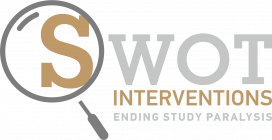Students
How can I even think about study when I have so many assessments to do?
A great advantage of the SWOT system is pending assessment tasks, assignments, performance practice or projects can be “built into” the SWOT study sets. This means time is allocated for upcoming tasks within the SWOT system, with a time scheduled in a structured way, in order to meet deadlines.
Why do I feel so guilty doing anything else, but sit at my desk?
A cornerstone of the SWOT Intervention is training you to understand “time on” and “time off” and keeping these boundaries well checked. Of the many advantages of the SWOT system, one of the best is the guilt free time off after the high intensity productivity. These firm boundaries with a SWOT Intervention means you can re-discover the freedom of a ‘real break from study’ and better quality time for interpersonal interactions.
Because the plan and the map of progress is tracked, recorded and regularly reviewed, any snags are quickly identified and steered back on track.
I already have a tutor, why do I need SWOT as well?
A SWOT Intervention is not tutoring or content based teaching – our SWOT trainers are experts in teaching you how to be productive, how to get a system into your work and how to break through procrastination.
A SWOT Intervention is not a talking or ‘advice’ giving intervention – it is an action intervention based on tried and tested strategies.
A SWOT Intervention is not based on academic ability – it works for everyone and will help you do the very best you can.
Exams always have questions on material that I didn’t study. How do I know if my notes are complete?
This is a key strength of the SWOT system. A SWOT Intervention very effectively identifies content gaps – and can remedy what’s missing before the exams. Because the SWOT trainer knows and understands how the National Education Standards Authority (NESA) use the syllabus to construct examination papers, they can identify and steer your senior student towards making sure every, single examinable content area is covered.
Study skills are taught at various seminars and sessions at school, how is this any different?
School programs do provide valuable assistance and advice on improving study skills and techniques. There are support structures in place in most schools which adequately prepare students for the task of senior study. Guest speakers and experts do provide excellent resources for year groups when provided at key points in the school program. Specific and intensive one-to-one analysis of the home situation and the specific road-blocks that an individual student faces in their path toward final exams, is not possible in a year group structure.

